Điểm nhấn
-
 Hội thảo “Thực trạng người Việt Nam hồi hương từ Vương quốc Anh giai đoạn 2014 - 2023”
Hội thảo “Thực trạng người Việt Nam hồi hương từ Vương quốc Anh giai đoạn 2014 - 2023”
-
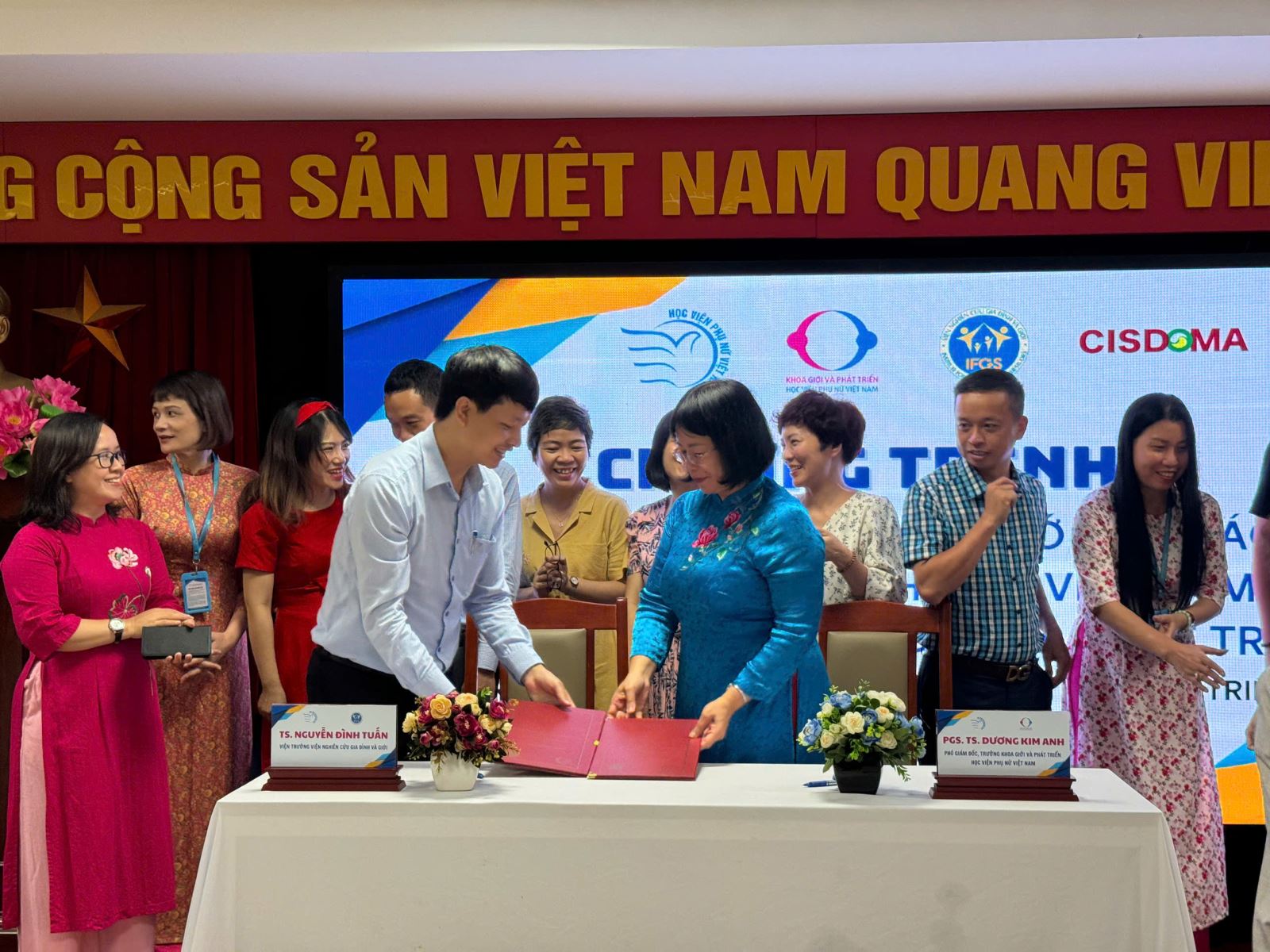 Lễ Ký kết biên bản ghi nhớ hợp tác giữa Học viện Phụ nữ Việt Nam với Viện Nghiên cứu Gia đình và Giới
Lễ Ký kết biên bản ghi nhớ hợp tác giữa Học viện Phụ nữ Việt Nam với Viện Nghiên cứu Gia đình và Giới
-
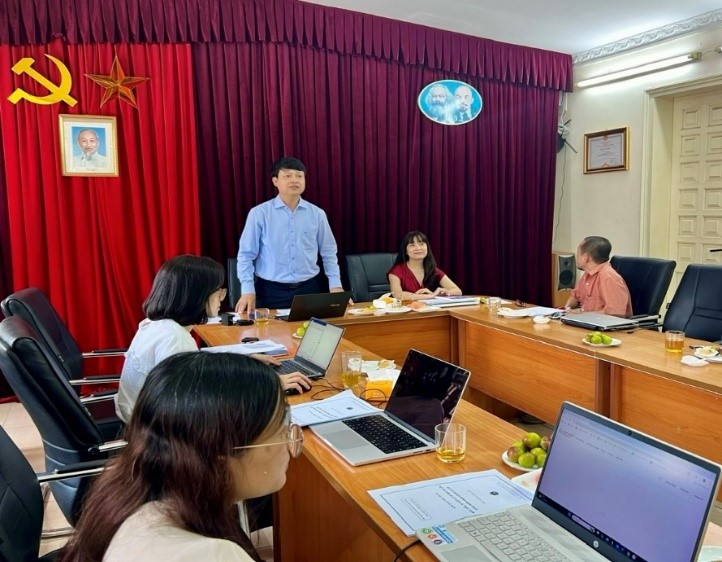 Hội thảo khoa học: "Bộ chỉ số gia đình hạnh phúc: Một số vấn đề lý luận và thực tiễn"
Hội thảo khoa học: "Bộ chỉ số gia đình hạnh phúc: Một số vấn đề lý luận và thực tiễn"
-
 Tọa đàm khoa học "Vận dụng lý thuyết trong nghiên cứu khoa học xã hội"
Tọa đàm khoa học "Vận dụng lý thuyết trong nghiên cứu khoa học xã hội"
-
 Hội nghị Đối thoại giữa Chi ủy, Lãnh đạo viện với đảng viên, viên chức và người lao động Viện nghiên cứu Gia đình và Giới 6 tháng đầu năm 2024
Hội nghị Đối thoại giữa Chi ủy, Lãnh đạo viện với đảng viên, viên chức và người lao động Viện nghiên cứu Gia đình và Giới 6 tháng đầu năm 2024
-
 Chi bộ Viện nghiên cứu Gia đình và Giới tổ chức sinh hoạt chuyên đề: Đoàn kết thống nhất trong Đảng theo tư tưởng Hồ Chí Minh
Chi bộ Viện nghiên cứu Gia đình và Giới tổ chức sinh hoạt chuyên đề: Đoàn kết thống nhất trong Đảng theo tư tưởng Hồ Chí Minh
-
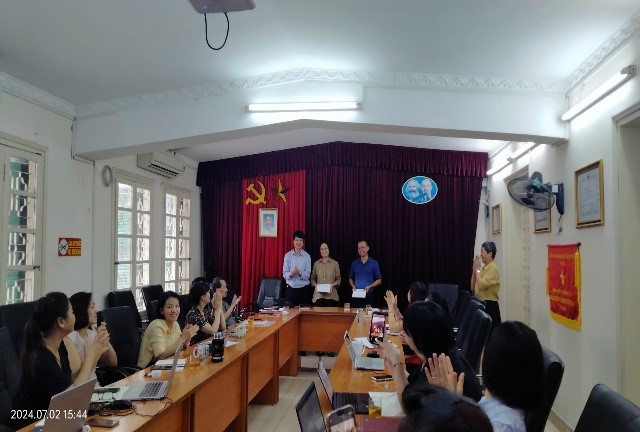 Cuộc thi “Nét đẹp và giá trị gia đình Việt Nam” hưởng ứng Ngày Gia đình Việt Nam 2024
Cuộc thi “Nét đẹp và giá trị gia đình Việt Nam” hưởng ứng Ngày Gia đình Việt Nam 2024
-
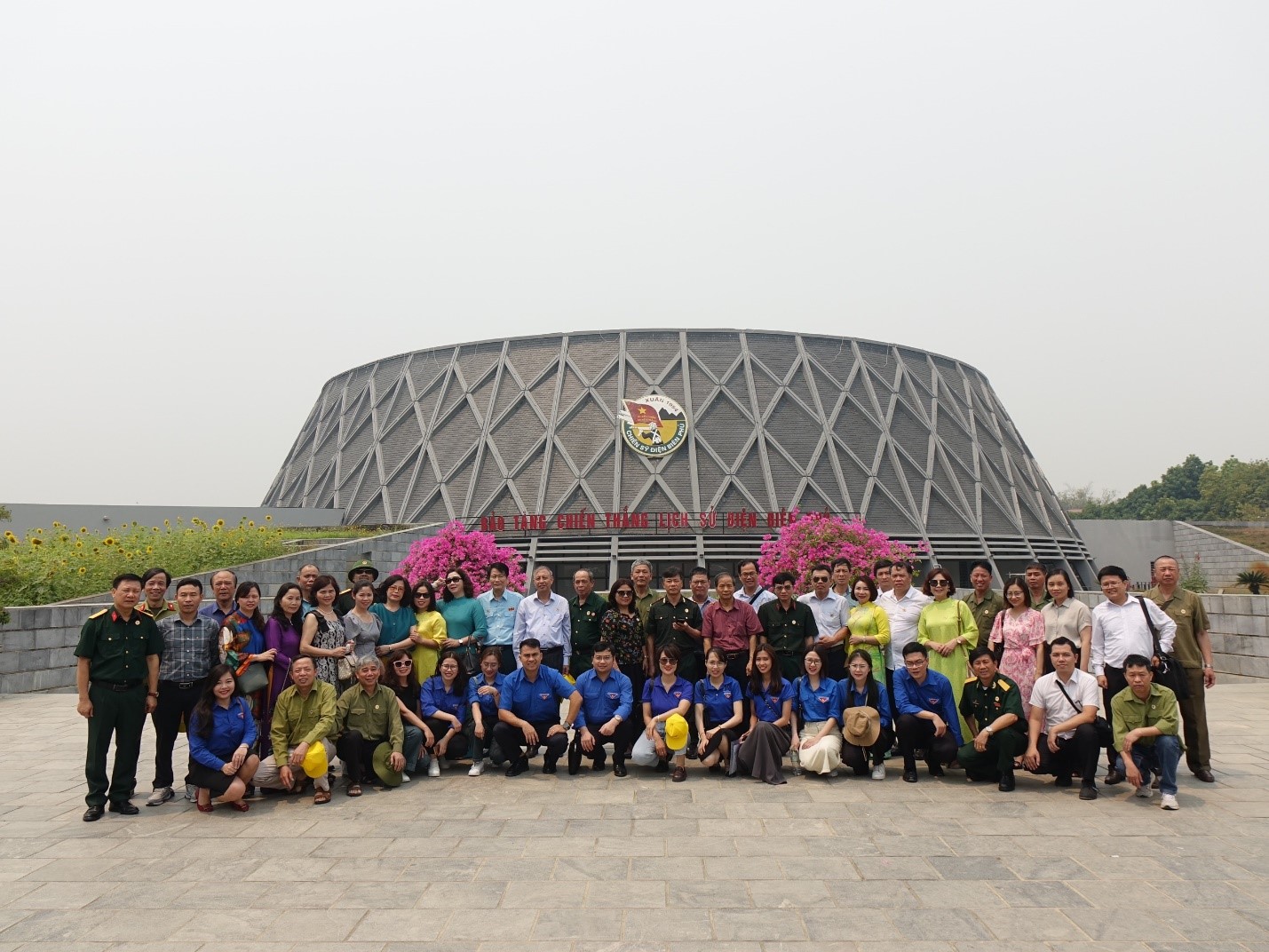 Hội Cựu chiến binh, Đoàn Thanh niên Viện Hàn lâm Khoa học xã hội Việt Nam đi thăm lại chiến trường xưa Điện Biên Phủ
Hội Cựu chiến binh, Đoàn Thanh niên Viện Hàn lâm Khoa học xã hội Việt Nam đi thăm lại chiến trường xưa Điện Biên Phủ
- Tổng mục lục Tạp chí 2023
-
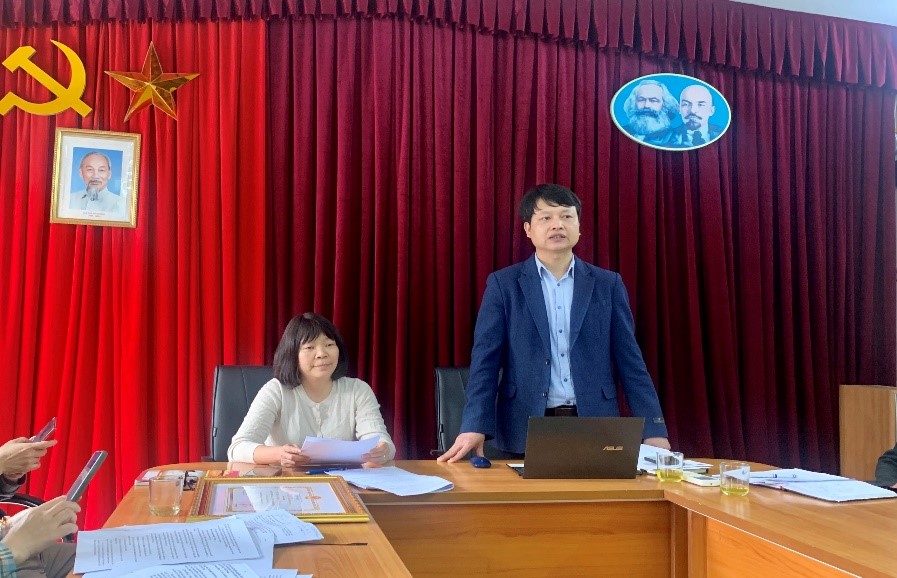 Viện nghiên cứu Gia đình và Giới phát động phong trào thi đua và ký Giao ước thi đua năm 2024
Viện nghiên cứu Gia đình và Giới phát động phong trào thi đua và ký Giao ước thi đua năm 2024
Liên kết web
Số lượt truy cập
23
5407463
Chi tiết tạp chíNo. 2 - 2018
In the context of aging population and various social and policy issues facing elderly care, the Institute for Family and Gender Studies deploys the project “Strengthening Social Engagement in Elder Care in the Transformation of the Economic and Family Structure in Asia: Policy and Practical Dialogue among Local Communities in Vietnam and Japan” during 2016-2018 with the sponsorship of Toyota Foundation, Japan, under the chair of Assoc. Prof. Dr. Tran Thi Minh Thi as a project director. Within the project framework, the international seminar “Strengthening Social Engagement in Elder Care: Policy and Practical Dialogues among Local Communities in Vietnam, Japan and the United Kingdom” was held in two days, from 2nd to 3rd of May 2018 in Hanoi.
The workshop was organized to analyze and share lessons learned on the system of social welfare policies and the practice of elderly care at the family and community levels from researchers, managers, and practitioners working in this field in a number of economies, cultures, and societies such as Japan, United Kingdom and Vietnam.
The workshop attracted a great deal of attention and participation of various representatives from local and international organizations.
Prof. Dr. Nguyen Quang Thuan, President of Vietnam Academy of Social Sciences attended and gave the opening speech.
On behalf of Japan, Ms. Michiru Sasagawa, Toyota Foundation representative, attended and co-chaired the workshop.
The workshop was attended by representatives from agencies such as the Ministry of Culture, Sports and Tourism; the Ministry of Health; the Ministry of Education and Training; the Ministry of Labor, Invalids and Social Affairs; the Vietnam Association of the Elderly; the Social Affairs Committee of the National Assembly; the National Assembly Office; the Association of Sociology. In addition, the workshop also attracted the participation of scientists, experts, and lecturers in the field of family, gender and the elderly in Vietnam. The seminar also included the participation of the central and local press agencies to write articles and news.
On the international side, scientists from the University of Manchester Metropolitan (UK), Kumamoto Gakuen University, Kyoto Sangyo University (Japan), Minamata City Council of Welfare (Japan) joined and provided information and lessons learned from a comparative approach. The workshop also included international organizations in Vietnam such as JICA, ActionAids, HelpAge International, WB, UNFPA,...
During the two days of operation, the workshop consisted of four sessions. Session 1: Project participants and experts had a hands-on experience exchange at Bach Nien Thien Duc Center, Soc Son, Hanoi. 18 international and national presentations presenting at the workshop from Session 2 to Session 4, focusing on theoretical, institutional and practical issues in Vietnam, Japan and the UK in elderly care with the participation of family, community and society.
Session 2 with the theme “Models of Elder Care from European and Asian Perspectives: Theoretical, Frameworks, Institutional and Practical Experiences”.
The presentation “Elder care in an ageing world: theories and and implications” of Assoc. Prof. Dr. Tran Thi Minh Thi shows that despite of the similarities or differences in the aging context between Vietnamese, British and Japanese societies, it was possible to apply significant theories such as the diamond care framework, the theory of aging in the community in studies on aging and elder care. Prof. Dr. Hugh McLaughlin and Dr. Jopei Tan (Manchester Metropolitan University) presented their paper, “The Role of Elder Care in the UK: Policies, Challenges and Opportunities,” which presented evidence of rapid aging in Britain and dementia has become common and increased the burden of social care for the elderly.
Accordingly, the responsibility of the state for the community and the delivery of care by individuals and communities other than by the state was one of the most obvious changes in elder care policies in the UK, especially since the Care Act came into force in 2014. Prof. Dr. Nguyen Huu Minh, Editor-in-Chief of the Journal of Family and Gender Studies, in his presentation “Aging Population in Vietnam and some Policy Issues” focused on policy issues that need to be addressed for the state, the community, the family and the market in elder care. According to the professor, in the context of limited social services, the Vietnamese family continues to be the main institution of elder care and the use of the elderly in appropriate work environments should be encouraged.
Practical Experiences of Elder Care in Japan and Vietnam is the subject of Session 3 with six presentations by policy implementers and practitioners from Vietnam and Japan. Experience sharing from private care models from Japan and Vietnam suggests that private care is essential for the development of social services in the context of population aging. Lessons learned from the Japanese side that Vietnam should not invest too many private elder care centers to better control the service.
Session 4 on Social Engagement in Elder Care: Evidence from a Comparative Study between Japan and Viet Nam is the results of an analysis by Prof. Dr. Trinh Duy Luan (Vietnam’s Sociology Association) and researchers from the Institute for Family and Gender Studies. In the analysis of social support policies for the elderly in Vietnam todays, Prof. Dr. Tr?nh Duy Luân has reviewed all social support policies for the elderly. Prof. Dr. Trinh Duy Luan highlighted the limitations and gaps of policy in elder care, which focused only on the role of the state and ignored other parties.
With a variety of approaches, scientists and policymakers clarified the theories and suggested the application of elderly care approaches in the context of population aging, as well as analysed the opportunities and challenges of the population aging in Vietnam and policy issues that adapt to the population aging. Assoc. Prof. Dr. Tran Thi Minh Thi, Director of the Institute for Family and Gender Studies, said that in Vietnam, families still played an important role in spiritual and material care for the elderly. Strengthening the involvement of the community, social organizations, and the state in elderly care, however, was one of the essentialities to create sustainability and welfare for the elderly in Vietnam in particular and in aging societies in general.
Within the framework of the Ministerial-level Program “A Comprehensive Study and Assessment of the Family in a Period of Industrialization, Modernization, and International Integration “ (Code: KHXH-GS/16-19), On June 28th 2018, in Hanoi, the Vietnam Academy of Social Sciences organized an international scientific seminar entitled “ The Changing Vietnamese Family within the Context of Family Dynamics Worldwide”.
The objective of the workshop was to share and exchange research results on the transformation of family characteristics in Vietnam among the program projects as well as the work of international scholars from other countries in Asia-Pacific such as Laos, Cambodia, Japan, South Korea, and Australia.
The seminar attracted the participation of numerous representatives from domestic and foreign organizations. On the domestic side, there is the presence of Prof. Dr. Nguyen Quang Thuan, President of the Vietnam Academy of Social Sciences, Chairman of the Program; Prof. Dr. Nguyen Huu Minh, Vice Chairman of the Program; the managers and members of 12 projects; the representatives of specialized research institutes and universities such as the Ho Chi Minh National Political Academy, Hanoi University of Social Sciences and Humanities, Graduate Academy of Social Sciences, Women’s Academy. In addition, the workshop also included representatives from ministries, such as the Ministry of Culture, Sports and Tourism; the Ministry of Labor, Invalids and Social Affairs; and other organizations.
On the international side, scientists from the National Academy of Social Sciences of Laos; The Royal Cambodian Academy of Sciences; RMIT University, Australia; Seoul National University, Korea; Singapore Management University; The University of Kobe, Japan have participated and shared the research results and the lessons learned from the process of family transformation in other countries. The workshop also attracted the participation of representatives from international organizations in Vietnam such as UN Women and other international organizations.
After the opening speech of Prof. Dr. Nguyen Quang Thuan, President of the Vietnam Academy of Social Sciences, Chairman of the Program and the workshop introduction of the Prof. Dr. Nguyen Huu Minh, Vice Chairman of the Program, the seminar was divided into 3 main sessions. Session 1 and session 2 presented the research results on changes in functions and characteristics of Vietnamese families conducted by the Program in the period 2016-2018. Session 1, entitled “Family in the relation with other social institutions”, includes presentations on “Main Basic Characteristics of Marriage in Vietnam” by Prof.Dr. Nguyen Huu Minh; “Middle Class Family in Vietnam in the Context of Socioeconomic-Cultural Development Processes” by Prof. Dr. Trinh Duy Luan; “Economic functions of Vietnam’s Family: Changing Trend and Policy Implications” by Assoc. Prof.Dr. Nguyen Chien Thang; “Practices of folk belief in Vietnamese family: Basic characteristics” by Dr. Nguyen Ngoc Mai.
Session 2 with the theme “Family from multidimensional view” includes presentations: “Basic Values ??of Contemporary Family in Vietnam” by Assoc. Prof. Dr Tran Thi Minh Thi; “Some Main Changes in Family Characteristics in Vietnam in the Last Decades” by Dr. Tran Thi Hong; “Domestic Violence Prevention Experiences in some Countries and Practices in Vietnam” by Assoc. Prof. Dr. Dang Thi Hoa; “Factors Influencing Divorce in Viet Nam: A Case Study of Hanoi, Khanh Hoa and Tien Giang” by Assoc. Prof. Dr. Vu Manh Loi. With diverse approaches from different dimensions, different functions of the family, the presentations highlighted key issues in the transformation of the Vietnamese family and outlined the overall picture of the contemporary Vietnamese family.
Session 3, titled “Family Trends – International Experience and the Case of Vietnam”, focuses on the characteristics of family change as well as sharing lessons learned from different countries on family changes. This session included six presentations: “Families Relation, Culture and Family Changes in Lao People’s Democratic Republic” by Vanxay Keoxayavong; “A Corner of the Khmer Family Transformation – Reflect on Personal Observation” by Dr. Chhort Bunthang; “Family Support for Older Persons in Thailand” by Assoc. Prof. Bussarawan Puk Teerawichitchainan; “Challenges to Contemporary Korean Family” by Prof. Dr. Ki-Soo Eun; “Family Changes in Japan: Focusing on the Declining Birthrate” by Prof. Dr. Yoshihiko Shiratori and “Family sociology and poverty-Context in Australia” by Dr. Karien Dekker. Issues in the process of family change in developed and underdeveloped countries are valuable lessons for Vietnam.
In general, the scholars and participants were highly appreciative and had a great deal of comments and comments on the papers presented at the workshop. Participants also highlighted the role and importance of studies on family dynamics in general and the program “A Comprehensive Study and Assessment of the Family in a Period of Industrialization, Modernization, and International Integration” in particular in the cause of socio-economic development of the country. In the context of the lack of national studies on the family, the Family Program studies are of particular importance in providing relevant data for the adjustment and promulgation process of family policies.
On behalf of the Family Program and the Organizing Committee, Prof. Dr. Nguyen Huu Minh would like to thank the contributions of scholars and believed that through the workshop the projects under the Program will continue to improve in order to provide deeper arguments for policymaking in family issues in Vietnam. Prof. Nguyen Huu Minh also emphasized that the seminar on family change on Vietnamese Family Day 28-6 is an important and meaningful activity for practically honoring Vietnamese families.
Abstract: The survey was conducted with more than 1,300 high school students who were selected from six schools in three Ha Noi districts. The objective of this survey was to explore the status of the connection Ha Noi high school students have with their families. It also explores the social factors associated with these connections. The results showed that although high school students are in transition from childhood to adulthood, they still maintain good connections with their families, and especially good relationships with their parents. It was also clear from the data that neither students’ social demographic factors nor their families’ economic conditions were the predictive factors explaining their relationships with or connections to their families. The factors explaining the students’ connections to their families were their parents’ marital status and education levels. In addition, students who had 1,000 or more online friends were at risk for poorer connections with their parents and others in their families.
Child Care Diamond in Transforming Vietnam
Abstract: With the introduction of the economic reforms (Doi moi) since 1986, Vietnam has undergone a transition from a centrally planned economy to a market oriented one. The Renovation has transformed Vietnam from a very poor post- war country to a lower middle income country within a quarter of a century. During this time economic development, international integration and demographic and cultural changes have significantly altered family relations, practices and behaviours. Child care responsibilities have shifted away from the family to provision of daycare services in order to mobilise women into the labour force, but traditional Asian values place double burden on family in child care. This paper analyses changing nature of Vietnamese society and its impact upon childcare provision among state, family, market and community; the policy and gendered natures of this provision and how they create even more tensions for women in Vietnam in the cultural background of familianism, and socialism.
Agriculture, Food and Nutrition Security -Analysis from a Gender Lens
Abstract: Agriculture is one of the most important economic sectors in Viet Nam. It has made great strides in the past years and Viet Nam has become a leading global exporter of agricultural products. Vietnam’s legal and policy system on agricultural, food and nutrition security has gradually improved with an expanded range of beneficiaries, greater attention paid to equality in benefiting from policies, and larger and more diversified resources for policy implementation. Based on a desk review, quantitative analysis of national statistics and qualitative assessment taken in Ninh Thuan and Lao Cai provinces, this discussion paper aims to provide evidence on gender inequality in access to key agricultural resources and food and nutrition security in Viet Nam’s context, and to contribute to public debates on policy design in Viet Nam.
Spousal Power Relations in Vietnamese Families: A Case Study in the North Central Region
Abstract: The power balance between husbands and wives, which is usually measured by the degree of decision-making power each holds in regard to family matters, is amongst the most important aspects of gender equality within families. This paper examines data surveyed in two provinces in the North Central region of Vietnam in 2013 and analyses characteristics of the power balance between husbands and wives. The results show that the decision-making power of husbands and wives in the surveyed families reflects a traditional pattern, wherein the husband is the primary decision maker in major family matters, including purchasing land, houses or expensive furniture; and selecting children’s occupations. Decisions related to housework and childcare are then primarily made by the wife. Depending on each family matter, individual socio-economic characteristics of the husband and wife are likely to increase or decrease their individual decision-making power in family matters. For example, the higher the husbands’ income, the less likely he is to be the primary decision maker in housework or childcare.

